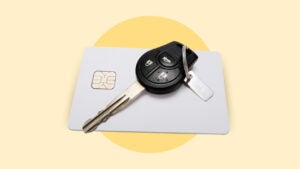Should I buy a car with my partner? Don’t let Cupid decide

Key takeaways
- Before buying a car with your partner, it’s essential to consider your relationship’s health, your budget and how you will split the financial responsibilities.
- Submitting a joint application and cosigning a car loan are different legal arrangements with varying levels of responsibility and ownership. Choosing the best option for your situation is important.
- Clear communication and realism about your finances can protect against future problems in a relationship, especially when making a big shared purchase like a car.
Combining finances with your partner is not as simple as splitting the check when grabbing dinner or booking a vacation. And when it comes to an auto loan, signing on the dotted line is a serious endeavor and should be treated as such.
However, the shared responsibility of a financial commitment might be the right next move for you and your partner. If you have considered purchasing a vehicle with your partner, it’s important not to rush in. Consider if shared vehicle ownership — or simply cosigning the other person’s loan — is wise for your relationship and your wallet.
3 questions to consider before buying a car with a partner
If buying a car is your next step, it’s wise to first consider how combining finances can impact your relationship’s health. According to Bankrate’s 2025 Financial Infidelity Survey, 40 percent of U.S. adults married or living with a partner have kept a financial secret from that person.
Suppose you or your partner are not being fully honest about what you spend on coffee a month or, more seriously, credit card debt. Could you trust each other to keep up with car payments?
Myah Moore Irick, a Merrill Private Wealth Advisor with the Irick Group, works with married and unmarried couples to navigate their financial journey. She believes “it is important that you and your spouse agree on decisions about money, spending, saving and investing.”
She even recommends exchanging credit reports, which can help you feel confident about your partners’ honesty before making a sizable financial commitment.
These are critical questions to consider before deciding whether purchasing a vehicle with your partner is a good idea.
1. How solid is your relationship?
The first question you must consider is your relationship’s strength. Sharing financial responsibility with another person is a serious commitment. That means having some potentially challenging conversations about your and your partner’s finances and attitudes about spending.
“When thinking about merging finances,” says Moore Irick, “the goal is to ensure that you begin the financial conversation early and have a wealth or financial plan in place that will help guide you.”
To feel empowered and confident, you need to be honest with one another. Think about how previous financial conversations with your partner have gone. Did they end in a satisfying compromise or lasting hard feelings? Or have you avoided these conversations entirely?
If you and your partner have struggled to have conversations about finances, consider working with a financial advisor or therapist. On the other hand, if you and your partner live together successfully and rarely have financial tiffs, you can likely handle buying a car together.
2. What is your budget?
Although purchasing with another person makes a big purchase more affordable, don’t bite off more than you can chew. Experts recommend keeping your monthly car loan payment below 10 to 15 percent of your combined take-home pay.
Align on what you can afford before you start shopping. Then you can decide what sort of car you need. Choosing the right vehicle for you means considering your budget, favorite style and color. But just as with most aspects of a romantic relationship, you must also consider your other half’s wants and needs.
Instead of aesthetics, focus on how you’ll use the car. A fuel-efficient car is great for long commutes. If you’re both adventurers, you might prioritize high clearance and four-wheel drive.
3. How will you split the finances?
Remember that you will have expenses beyond your monthly loan payment. Who fills up the gas tank after using the vehicle? Who covers trips to the maintenance department?
Determine how you split additional vehicle costs before signing the dotted line. You have multiple options. For example:
- Both partners split all costs evenly, perhaps by paying for them from a shared account into which you make equal contributions.
- Each partner pays a share of the cost proportionate to their income.
- One partner takes on all or most of the responsibility for these costs, while the other agrees to shoulder other shared expenses.
After deciding on a strategy, consider putting the details in writing and each keeping a signed copy of the agreement.
Weigh other long-term goals before choosing who will pay for specific aspects of your shared vehicle.
“As you begin your life together, you may be considering short-term financial goals, such as paying for your wedding and repaying debt,” Moore Irick says. So, just because you can afford a more expensive vehicle doesn’t mean allocating a big chunk of your paychecks to it is a good move.
Buying a car together vs. cosigning
Both co-owning and cosigning a car with your partner will result in a new shared set of wheels. The legalities between the two routes differ. And if your relationship ends, your choice makes a big difference.
When you co-own a vehicle, you take out a joint auto loan where both borrowers carry equal responsibility for the vehicle’s monthly payments. If the relationship ends, you could agree to refinance the vehicle in one person’s name or sell the vehicle and split the proceeds. You may need a lawyer’s help to sort out the details, especially if you and your ex-partner disagree about what to do.
With a cosigned auto loan, the primary borrower has the main responsibility. The other person only has to pay if their partner does not. The cosigner has no legal right to the vehicle, and their name is not on the title. After a split, the primary borrower has ownership and can remove the other partner from the loan by refinancing or getting a cosigner release.
People often choose to have a cosigner if their credit score is lacking and they have a close friend or family member with better credit. This process can improve available rates and terms for the primary borrower.
Bottom line
Buying a car with your partner is an exciting prospect, but don’t get caught up in the romance without taking a serious look at your shared finances first. Avoid keeping secrets that could result in money troubles and relationship conflict.
According to Bankrate’s Financial Infidelity Survey, 45 percent of Americans in committed relationships say financial secrets are as bad as physical infidelity. In that, over half (38) say it is as bad as physically cheating. Keeping money secrets from your partner has serious implications and communicating with openness and empathy can be the key to avoiding issues.
“Navigating romantic relationships and money is not always comfortable,” Moore Irick says. But, “armed with the right tools and the right advisors, discussing money can be exciting and empowering.”
Why we ask for feedback Your feedback helps us improve our content and services. It takes less than a minute to complete.
Your responses are anonymous and will only be used for improving our website.







